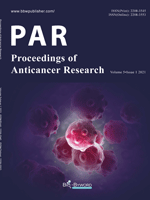Abstract
Objective: To explore the effect of bevacizumab combined with neoadjuvant chemotherapy in advanced ovarian cancer and the occurrence of adverse reactions. Methods: A total of 80 patients with advanced ovarian cancer, treated in Affiliated People’s Hospital of Inner Mongolia Medical University from June 2019 to December 2020, were randomly divided into two groups. In the chemotherapy group, 40 patients were treated with neoadjuvant chemotherapy, while in the combined group, another 40 patients were treated with bevacizumab combined with neoadjuvant chemotherapy. The therapeutic effects were compared at the end of the treatment cycle. Results: There was no significant difference in the levels of CA125, CEA, and VEGF between the two groups before treatment. However, after the treatment cycle, the levels of CA125, CEA, and VEGF in the combined group were significantly better than those in the chemotherapy group (P < 0.05). At the same time, the incidence of adverse reactions of the chemotherapy group was 67.50%, which was significantly higher than that of the combined group (35.00%; P < 0.05). Conclusion: Bevacizumab combined with neoadjuvant chemotherapy for patients with advanced ovarian cancer has significant curative effect. The combined therapy reduces the levels of tumor markers and inflammatory factors, improves patients’ quality of life, as well as reduces adverse reactions. It has high clinical promotion value.
References
Huang S, 2017, Clinical Effect Analysis on Bevacizumab Combined with Neoadjuvant Chemotherapy of the Advanced Ovarian Cancer. Chinese Journal of the Frontiers of Medical Science (Electronic Version), 9(6): 109-112.
Ma L, Zhou Q, Li R, 2017, Study on the Short-term Efficacy and safety of Bevacizumab Combined with Chemotherapy in Platinum-sensitive Recurrent Ovarian Cancer. Chongqing Medicine, 46(11): 1532-1535.
Zhang J, Zhang C, Zhang W, et al., 2020, Nursing Strategies for Patients with Recurrent Ovarian Cancer Treated with Bevacizumab Combined with Other Chemotherapy Drugs. Women’s Health Research, (1): 175-176.
Liu H, Guan Y, Sun Y, et al., 2018, Effect of Intraperitoneal Bevacizumab Combined with Thermochemotherapy on Blood Transforming Growth Factor in Elderly Patients with Ovarian Cancer ?1 and Macrophage Migration Inhibitory Factor. Chinese Journal of Geriatrics, 37(4): 434-436.
Jiang F, Gao Y, Ren X, et al., 2019, Efficacy and Safety Analysis of Bevacizumab Combined with Chemotherapy in the Treatment of Platinum-sensitive Recurrent Ovarian Cancer. Hebei Medicine, 25(8): 1384-1387.
Li Y, Yang Y, Shang Y, et al., 2015, Clinical Efficacy and Safety of Bevacizumab Combined with Chemotherapy in the Treatment of Recurrent Ovarian Cancer were Analyzed Retrospectively. The Chinese Journal of Clinical Pharmacology, (15): 1500-1502.
Tian Y, 2020, Efficacy and Safety Research of Bevacizumab Combined with Chemotherapy in Patients with Poorly Tolerated Recurrent Ovarian Cancer. Proceeding of Clinical Medicine, 29(5): 346-348.
Chen W, Chou H, Yang L, et al., 2021, Postoperative Adjuvant Dose-Dense Chemotherapy with Bevacizumab and Maintenance Bevacizumab after Neoadjuvant Chemotherapy for Advanced Ovarian Cancer: A Phase II AGOG/TGOG Trial. Journal of Clinical Oncology, 39(15): 5540-5540.
